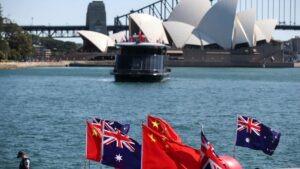China has lifted its ban on two Australian meat processing firms, paving the way for the full resumption of red meat exports to China, according to the official website of Australian Prime Minister Anthony Albanese.
China is Australia’s second-largest export market for beef and veal, trailing only the United States, and the lifting of the ban signifies a return to normalcy for beef and veal exports, with export value projected to surpass A$2.2 billion for 2023–2024, said Albanese.
Don Farrell, Australia’s Minister for Trade and Tourism, noted that nearly all trade barriers with China have now been removed, which had impacted Australian exports worth around A$20 billion. “Removing trade barriers has not only saved Australian jobs but also created thousands of new ones.”
When asked to confirm the news, Chinese Foreign Ministry spokesperson Lin Jian said that China is willing to work with Australia to address mutual concerns through dialogue and consultations, aiming to make the China-Australia relationship more mature and stable.
On the same day, China’s General Administration of Customs updated its list of foreign countries or regions meeting the requirements for exporting meat products to China, which reinstates exports from two Australian companies (registration numbers 243 and 1620) for products produced on or after December 3 that comply with Chinese regulations.
China has consistently been Australia’s largest trading partner, export market, and import source, however, due to diplomatic tensions, shifts in domestic public opinion in Australia, and the impacts of the COVID-19 pandemic, bilateral trade has declined in recent years. During the pandemic, trade disruptions also affected Australian exports of coal, wine, barley, and lobster to China.
According to updated records, China imposed sanctions on 10 Australian meat exporters between 2020 and 2022. In May 2020, China suspended imports from four Australian meat companies and two more companies voluntarily suspended exports in July 2020, before four others imposed sanctions between August 2020 and January 2022.
After Australian Prime Minister Albanese’s Labor Party took office in May 2022, relations between China and Australia began to thaw. Since early 2023, Australian products such as coal, timber, barley, beef, and hay have steadily reentered the Chinese market. According to Australian statistics, bilateral trade between China and Australia surpassed A$300 billion in 2023, marking an 8.2% year-on-year increase, and nearly 80% of Australia’s trade surplus in 2023 was attributed to trade with China.
By the end of 2023, China had reinstated three Australian meat exporters and in May 2024, restrictions on another five exporters were lifted. With the recent lifting of restrictions on two more firms, all 10 sanctioned companies have resumed meat exports to China. In July 2024, China also added one more Australian beef company to the list of approved exporters.
Separately, in March 2024, China’s Ministry of Commerce announced the termination of anti-dumping and countervailing duties on Australian wine that had been in place since March 2021.
Don Farrell said that since the removal of tariffs in April, Australian wine exports to China have reached A$86 million, exceeding the total export volume of the previous three years combined.
In October 2024, the Australian government announced it had reached an agreement with China to fully resume live rock lobster exports by the end of the year, which is expected to save 3,000 Australian jobs in the sector. According to Julie Collins, Australia’s Minister for Agriculture, Fisheries, and Forestry, the resumption is projected to generate over A$700 million in trade opportunities.

